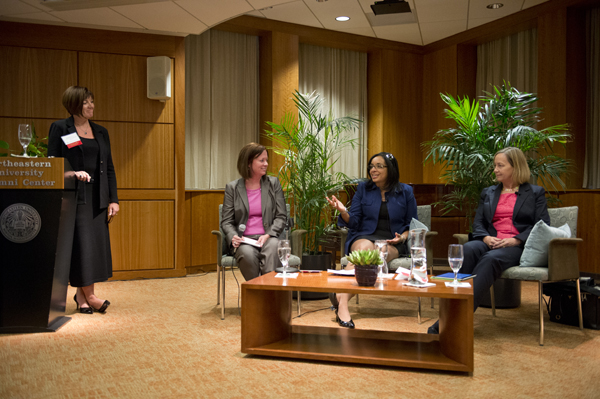The ‘inspiration’ behind the innovation

After graduating from business school, Lynne Wilson took a solitary desk job, but quickly learned that she would rather collaborate with her colleagues than work alone. “I found I had a knack for thinking about things a little differently and realized I had all these ideas about how to transform a business,” said Wilson, now the CEO of 3DVIA, Dassault Systèmes’ brand for interactive 3-D content.
On Tuesday evening in the Alumni Center, Wilson shared her career story with more than 80 Northeastern students, faculty, and staff, as well as professionals from area hospitals and organizations ranging from Akamai Technologies to the Boston Ballet. The event was the second in the Women Who Inspire speaker series, a Northeastern initiative designed to promote the advancement of women in science, sustainability, engineering, and technology.
Wilson was joined by three other distinguished female leaders at the forefront of 3-D imaging, big data, and cloud computing: Moderator Michele Flynn, chairman and chief strategy officer of Hiperos; Amy O’Connor, a big data evangelist for Cloudera and a graduate of Northeastern’s executive MBA program in the D’Amore-McKim School of Business; and Lauren States, the vice president of strategy and transformation for IBM and the chair of the Board of Visitors for the school of business.
The 90-minute discussion ranged from the effect of globalization to the importance of mentorship. Diane MacGillivray, senior vice president of university advancement, opened the conversation by praising the panelists and their accomplishments. “What you will hear will help shape your own education, whether you are new to the Northeastern community or have been here for a while,” she told the students in attendance. “You can learn a lot from these women.”
She was right. In the middle of the discussion, a first-year business student received advice from the panelists on breaking into the male-dominated business world.
“Think about what makes you unique,” suggested O’Connor, who considers herself a “geek in high heels.” “Try to figure out what drives the business you’re working for,” added Wilson, “and then do an important job really well.”
Career success, the panelists agreed, depends, in part, on finding a mentor. This is especially true in light of recent studies. According to a report in the Harvard Business Review, some 52 percent of women in science, technology, engineering, or math leave their job as a result of poor management, an unclear career path, or a lack of role models.
“Keep your mind and ears open and learn things from people all around you,” O’Connor said of finding a mentor. Flynn, for her part, urged students and professionals alike to keep in touch with professors, managers, and colleagues through social media platforms. “You have the opportunity and ability to stay connected so much more now than ever before,” she explained.
Following the discussion, panelists fielded a range of questions from audience members. Another first-year business student asked the experts to predict what emerging markets other than Brazil, Russia, India, or China would achieve the most success in the next few years.
States selected Africa, “because it’s building its core infrastructure with the latest technologies and making a lot of use of cloud computing.”
An IBM employee who frequently volunteers at middle schools in Boston wanted to know how to interest more girls in engineering careers, many of whom, she said, consider the field to be “boring and ugly.”
“We need to get stories out there that showcase women in technology,” O’Connor said. “They need to see they can be successful in these fields.”





